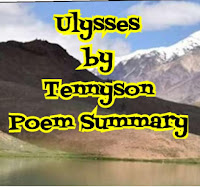Ulysses by Tennyson
summary
 |
| Ulysses......by Tennyson |
The war continued for ten years and the city of Troy was destroyed.The poem begins with Ulysses's desire for the fresh voyage. He wants to leave Ithaca because He has been living in Ithaca for some time. He is tired of his idle life. He has lived a life of adventure and does not want to rest from travel. He also wants to go on a new voyage to gain more knowledge of the world and the people around him. So he calls his companions to go with him on a new voyage to gain more knowledge of the world. Ulysses, the great hero tells us that he is sick of his idle life in the rocky island of Ithaca. He says that this type of life has no meaning for him. This island is wild and people are also uncivilized of this island.
The only eat, sleep and collect money.They have no ideals in life. According to Ulysses to rule over a barren land and uncivilized people is useless for him. He calls his old companions for taking action for a new voyage. He motivates his companions to go a voyage once again. Ulysses wants to enjoy his life to the full. He compares life to a cup of wine. As a man drinks a cup of wine till its last drop, similarly, He will try to taste life full. He has spent his life travelling the world and gained much knowledge and experience of life. It is the memory of these things that inspire him to sails once again. Ulysses has gained much experience of the sea life because he has travelled in the sea with his companions. He has visited various lands, government, people and climates. He went everywhere with the desire of gaining more knowledge.
Ulysses, the great hero tells us that he is not satisfied with what he has learnt. The knowledge which Ulysses has already gained, enables him to feel that there are still many things to be known. A life spent in idleness is life at all just as a sword loses its polish and gets rusty when It is kept out of use for a long time and the same happens with human beings. Ulysses tells that knowledge is vast and unlimited and our life on earth is too short to learn everything. An hour spent in some useful work means an hour saved from the hands of death. In this poem, Ulysses says that this son Telemachus is quite intelligent to perform the kingly duties and responsibilities.
Ulysses tells his wife Penelope that after his departure from the island his son will pay proper respect to his mother and perform his all duties very well. Now Ulysses calls his companions to go on a new voyage and call them for action. He reminds them that though they have grown old yet old age cannot kill their courage and spirit of adventure. He encourages them saying that old age has its own honor. He believes that even an old man can also perform great deeds. It is not too late to undertake a fresh adventure in searching for more knowledge.
He wants to go westwards and cross the western horizon where the Sun and the other stars seem to plunge into the sea. This is the appropriate time to start a new voyage to seek a new world of knowledge. Ulysses knowledge that there is a risk in the way of their new journey. It may be that their ships would be wrecked by the storm or It may be they would reach safely on isles. He further appeals to his sailors to show the same courage as they showed in their young age. Though they have been made weak by time, they have strong willpower to struggle, to seek and to find and not to yield in life.








